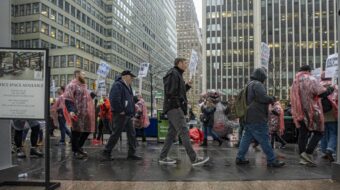
CHICAGO, Ill. – Cook County prosecutors here have issued a subpoena seeking the grades and emails of journalism students at Northwestern University. The students conducted a three-year investigation that they say found a man serving a life sentence for a crime he did not commit.
In a stunning show of support, 18 news organizations including The Associated Press, the Chicago Tribune and the Chicago Sun-Times jointly filed a brief in court Jan. 11 stating that the students should be protected under the Illinois’ Reporter’s Privilege Act. The New York Times and the Washington Post have also joined the fray saying the law gives journalists the right to not reveal unpublished information.
Critics note the case has enormous implications for the future of journalism, particularly student journalism. They say news organizations and working reporters, including journalism professors, understand the chilling affect a bad outcome could have. The media outlets contend the student journalists are entitled to the same protections as working reporters.
Attorneys for the university also filed a brief asking a Cook County Circuit judge to throw out the subpoena. The Student Press Law Center and the Society of Professional Journalists filed a similar brief.
The case in question involves Anthony McKinney, who was convicted of fatally shooting a security guard in 1978, a murder he says he never committed. At the time, prosecutors sought the death penalty, but a judge sentenced McKinney to life. He’s been behind bars ever since.
In 2003 the case was brought to the attention of Northwestern University Professor David Protess, who has been the head of the Medill Innocence Project there for the last 11 years.
Over the next three years, Protess, a crusader against wrongful convictions, led nine teams of students to revisit every detail of the case in his investigative journalism class.
The Northwestern students, after three years of researching and interviewing witnesses, claim their evidence proves McKinney’s innocence. They also said they found a man who told them on video he saw who did it and that McKinney was not at the scene of the crime.
In the original case two eyewitnesses placed McKinney at the scene, and he eventually confessed to police detectives. However all three later claimed they were beaten into making their statements by a detective who, it later turned out, had numerous brutality complaints against him.
By 2006 the students led by Protess, took their information to the Center for Wrongful Convictions, which is a group of student lawyers and professional lawyers at Northwestern. Soon after, as students have done before in all of the other cases they have investigated, they turned the information over to the Cook County State’s Attorney’s Office.
Two years later in 2008, lawyers for the center filed a petition asking that McKinney’s conviction be vacated or that he be granted a new trial. He was eventually granted a new trial, and a judge is currently reviewing his case.
Last year prosecutors issued a court-backed subpoena demanding that Protess turn over all material on the McKinney case. The document asked for all unpublished interviews; all notes, memoranda, reports and summaries made by the students; all electronic communications involving the case; the grade of each student who participated each quarter, the grading criteria and the syllabi.
Grades are typically protected under federal law, though they can be obtained under court order.
Prosecutors, who are now targeting the students, say they have compiled new information alleging some of the students may have paid-off and even flirted with witnesses to get good grades on their assignment. Prosecutors also allege the student’s purpose was not to report and write stories about McKinney’s case but rather to assist the defense in seeking to free him from prison.
They point out that they are seeking any information in search of the truth. Were the students motivated to find evidence of McKinney’s innocence solely to get good grades, prosecutors are asking.
One student, Diana Samuels, said she received an A in the class in 2008. Nonetheless, she argues, students don’t take the class for a grade but rather for the experience of going out there and working on a real story.
The students claim they were acting as reporters not as criminal investigators and that they did publish their information on their website and even cooperated with a reporter from the Chicago Sun-Times to produce a front page story.
Yet Cook County State’s Attorney Anita Alvarez says the students were acting as criminal investigators without any intent to publish anything. The fact that they turned their information over to the Center of Wrongful Convictions suggests that they were in fact working with the legal team in an investigative capacity.
Speaking to a reporter with Chicago Magazine, Alvarez said, “I have a duty to seek out whatever evidence is out there, and that’s what I’m doing.”
Alvarez is a Chicago native and career prosecutor with working-class roots. She recently became the first woman and Latino to hold her post in the second-largest prosecutor’s office in the nation.
Yet, Protess argues, Alvarez does not understand the nature of what he and his students do.
“She claims we’re investigators, not journalists. We claim that we’re investigative journalists – two concepts put together into a time-honored tradition of journalism that goes back centuries,” he said.
In recent history Northwestern students at the Medill program have helped exonerate eleven wrongfully convicted prisoners, including five on death row.
The students have been instrumental in helping victims of police abuse, forced confessions and wrongful convictions, supporters note.
Meanwhile oral arguments between the two parties and the crucial question of whether the students acted as reporters or criminal investigators will be decided in the coming period.











Comments